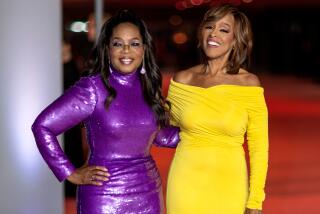‘Oprah’ exit may weaken daytime talk shows
- Share via
Oprah Winfrey’s exit from daytime TV will mean more than just a studio scuffle for the time slot she mined for gold for TV stations. It also likely signals, many experts say, the beginning of an inexorable decline for the daytime syndicated talk show, which has occupied a central spot in mainstream culture ever since “The Phil Donahue Show” rolled out nationwide nearly 40 years ago.
“Oprah” has been more than just a show; it serves as the cornerstone of a multimedia empire that has transformed books, diets and exercise schemes into instant bestsellers and made household names out of Dr. Phil, Dr. Oz and Rachael Ray. Winfrey has played a key role in encouraging frank and open discussion of such issues as sexual abuse and, with her endlessly chronicled weight gains and losses, body image.
Analysts say that the distributors behind “The Ellen DeGeneres Show” and “The Dr. Oz Show” will probably mount high-stakes offensives to persuade station managers currently carrying “Oprah” to give their talent that slot, which is at 4 p.m. in much of the nation, after Winfrey leaves in September 2011. But many observers say that the all-encompassing cultural role of “Oprah” is unlikely to be duplicated by another talk show on broadcast TV, thanks to the changes that have shaken society and the entertainment industry since Winfrey first started her talk show on a Chicago station in 1984. As cable continues to expand, broadcasters have entered an era of smaller audiences, diminished expectations and risk-averse decision-making. “Daytime TV as supplied by the networks is really all but dead,” said Steve Farella, chief executive of the New York ad-buying firm TargetCast. Farella predicts that after Winfrey departs, her audience and advertisers gradually will scatter to cable, leaving scraps for other broadcast talk hosts.
“It’s not because the talent isn’t there,” he added of daytime TV’s predicament. “It’s because the business isn’t there anymore.”
Indeed, Winfrey herself has turned to cable, forming the Oprah Winfrey Network (OWN) with Discovery Communications, expected to be the home for any of her future programming.
“People no longer watch television the way they did 25 years ago, when Oprah got her start,” said Larry Gerbrandt, a longtime entertainment analyst and principal at Media Valuation Partners.
When her show was syndicated starting in 1986, soap operas -- which required large time investments by viewers to follow convoluted plots -- were declining as many women entered the workforce. Donahue, with his groundbreaking talk show, had helped popularize a therapeutic approach to social and family problems that became the prototype for others, most notably Winfrey.
“She showed up at a time when it was all white men” hosting most national programs, said Adam Galinsky, a social psychologist at the Kellogg School of Management at Northwestern University. “Race relations were improving. She had these public struggles in her relationships and with her weight . . . Viewers watched her become this incredible public figure, but with her own set of weaknesses and idiosyncrasies. She was an authority figure but also part of your social network. That’s why she became big business for books and consumer goods.”
Winfrey was an immediate hit when her show launched nationally, quickly eclipsing “Donahue.” Personal confessions, whether of guests or Winfrey herself, were central to the show’s appeal. In one early episode, audience members stood up and revealed they were gay -- still a taboo act in mainstream American culture at the time. But other topics were far more sensationalistic: “I’m a Cross-Dresser” was the title of one episode.
Winfrey’s success inspired a swarm of imitators, and by the early 1990s the field was thick with “trash TV” shows such as “Geraldo,” where during one encounter the guests threw chairs and bloodied the host. So starting in the mid-1990s, Winfrey gambled and took the high road. She banned the most salacious topics, devoted more time to self-help experts and started a phenomenally successful book club. Rather than sink the program, as some critics feared, the changes enabled Winfrey to soar to new peaks in ratings and prestige, as she refashioned herself as a trusted guide for viewers examining their personal lives.
But in recent years, “Oprah” has been subject to the same downdrafts affecting the rest of broadcast TV. Her show has been grappling with tumbling ratings as cable outlets and DVRs have lured away viewers. TV stations, hit by sharp ad declines, are no longer able to fork over the hefty licensing fees that helped make Winfrey a billionaire. Viewers have gotten into the habit of grabbing news and video off the Internet, with less reliance on traditional broadcasters.
Analysts say the most likely contenders to replace “Oprah” are DeGeneres or Oz. That’s because those programs, unlike “The Maury Povich Show,” “The Jerry Springer Show” and other heavily sensationalized tabloid shows in the daytime arena, have content that’s widely acceptable to advertisers and viewers. Equally important, both happen to have current agreements that are set to expire in 2011, when Winfrey will sign off. Warner Bros., which distributes DeGeneres, is expected to make a big push for the opening, as is Sony, which distributes “Dr. Oz.” (Warner Bros. executives declined to speak for the record; Sony representatives said no one was available to comment.)
However, both shows represent substantial risks as “Oprah” replacements. DeGeneres draws fewer than half as many viewers as Winfrey. According to one insider, a key reason DeGeneres and her representatives were eager for her to take a role as a judge on “American Idol” this season was to boost the profile of her talk show. As for “Dr. Oz,” its ratings sometimes close in on those of “Dr. Phil,” the No. 2 talk show. But “Dr. Oz” is still in its first year and how the program will fare in coming months is far from certain.
The TV industry will thus be looking closely at the ABC owned-and-operated stations that currently carry “Oprah,” including KABC in Los Angeles. Those stations could decide to start their local newscasts early at 4 p.m., which would likely deliver an immediate tonic to the bottom line because there would be no more licensing fees to pay to an outside distributor and there would be more local ad time to sell. According to Bill Carroll, an analyst at New York-based Katz Media, other stations would likely follow whatever the ABC-owned stations do.
Even if studios want to try to recapture the glory days of “Oprah,” many observers say that the realities of the TV business mean that’s highly unlikely to happen.
“What TV stations are trying to do now is take less risk and somehow improve their margins,” said Derek Baine, a TV analyst at SNL Kagan. “I don’t know if they’re going to pony up for a big license-fee type show like ‘Oprah.’ ”
More to Read
The biggest entertainment stories
Get our big stories about Hollywood, film, television, music, arts, culture and more right in your inbox as soon as they publish.
You may occasionally receive promotional content from the Los Angeles Times.











